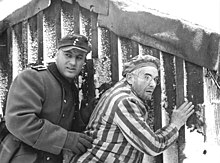Roads across the country
Paths across the country is a five-part television film produced by the German television network of the GDR . The script was written by Martin Eckermann , who also directed, based on a scenario by Helmut Sakowski .
action

At the center of the story is Gertrud Habersaat, who initially served on a large farm in the German Empire and then ran an expropriated farm in conquered Poland. She takes on three children and is a new farmer herself after the land reform . Closely involved in the events surrounding the merger of farmers in her village into agricultural production cooperatives and their opponents, she then takes over the chairmanship of the LPG . Subplots show the fight of the communist Willi Heyer against the Nazis and the development of the landowner Jürgen Leßtorff.
The film focuses on the years during and after the Second World War , flight and expulsion , the time in the Soviet occupation zone and in what would later become the GDR up to 1953.
It was first broadcast on German television from September 22 to 29, 1968. According to DFF surveys, routes across the country achieved an average audience rating of 77.7% in the GDR, or around 7.8 million viewers.
Awards
The film collective (scenario writer Helmut Sakowski, director Martin Eckermann, dramaturge Helga Korff-Edel , cameraman Hans-Jürgen Heimlich and the main actors Ursula Karusseit, Manfred Krug and Christa Lehmann) received the GDR First Class National Prize on October 3, 1968 . Angelica Domröse received the GDR Art Prize on October 2, 1969 .
Reviews
The Protestant Film Observer summarizes his criticism as follows: “The depiction of Hitler's rule in Poland is impressive and worth seeing, even for Federal Republicans. The television series would have become more realistic if the plot threads had only been juxtaposed in a relevant manner. "
Novel editions
- Helmut Sakowski: Routes across the country . TV novel. Mitteldeutscher Verlag Halle (Saale), 1969.
- Helmut Sakowski: Routes across the country . Novel. Aufbau-Taschenbuch-Verlag , 2005. ISBN 3-7466-1361-2
Individual evidence
- ↑ Since the early 1990s, the film has been shown on various television broadcasts as a six-part. Parts 2 and 3, each well over 90 minutes long in the original, were split into three shorter episodes.
- ↑ a b Film bibliographic annual report 1968, p. 143.
- ↑ http://www.fernsehserien.de/index.php?serie=4704
- ↑ Rainer Rosenberg, Ingeborg Münz-Koenen, Petra Boden, Gabriėle Gast: The spirit of unrest. 1968 in comparison. Science, literature, media . Akademie Verlag, 2000. ISBN 978-3-05-003480-5 . Pp. 261-262.
- ↑ Evangelical Press Association, Munich, Review No. 372/1969
